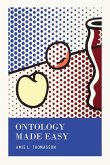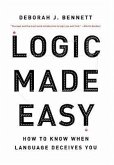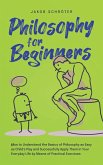Amie L. Thomasson
Ontology Made Easy
Amie L. Thomasson
Ontology Made Easy
- Broschiertes Buch
- Merkliste
- Auf die Merkliste
- Bewerten Bewerten
- Teilen
- Produkt teilen
- Produkterinnerung
- Produkterinnerung
Existence questions have been topics for heated debates in metaphysics, but this book argues that they can often be answered easily, by trivial inferences from uncontroversial premises. This 'easy' approach to ontology leads to realism about disputed entities, and to the view that metaphysical disputes about existence questions are misguided.
Andere Kunden interessierten sich auch für
![Ontology Made Easy Ontology Made Easy]() Amie L ThomassonOntology Made Easy136,99 €
Amie L ThomassonOntology Made Easy136,99 €![Ordaining Reality Made Easy Ordaining Reality Made Easy]() Joseph E. DonlanOrdaining Reality Made Easy33,99 €
Joseph E. DonlanOrdaining Reality Made Easy33,99 €![Essay Towards an Easy and Useful System of Logic Essay Towards an Easy and Useful System of Logic]() Robert BlakeyEssay Towards an Easy and Useful System of Logic37,99 €
Robert BlakeyEssay Towards an Easy and Useful System of Logic37,99 €![Exercises on Mechanics and Natural Philosophy; or An Easy Introduction to Engineering Exercises on Mechanics and Natural Philosophy; or An Easy Introduction to Engineering]() Thomas TateExercises on Mechanics and Natural Philosophy; or An Easy Introduction to Engineering35,99 €
Thomas TateExercises on Mechanics and Natural Philosophy; or An Easy Introduction to Engineering35,99 €![A Plain And Easy Introduction To The Newtonian Experimental Philosophy A Plain And Easy Introduction To The Newtonian Experimental Philosophy]() Benjamin MartinA Plain And Easy Introduction To The Newtonian Experimental Philosophy28,99 €
Benjamin MartinA Plain And Easy Introduction To The Newtonian Experimental Philosophy28,99 €![Logic Made Easy Logic Made Easy]() Deborah J BennettLogic Made Easy42,99 €
Deborah J BennettLogic Made Easy42,99 €![Philosophy for Beginners How to Understand the Basics of Philosophy as Easy as Child's Play and Successfully Apply Them in Your Everyday Life by Means of Practical Exercises Philosophy for Beginners How to Understand the Basics of Philosophy as Easy as Child's Play and Successfully Apply Them in Your Everyday Life by Means of Practical Exercises]() Jakob SchröterPhilosophy for Beginners How to Understand the Basics of Philosophy as Easy as Child's Play and Successfully Apply Them in Your Everyday Life by Means of Practical Exercises11,99 €
Jakob SchröterPhilosophy for Beginners How to Understand the Basics of Philosophy as Easy as Child's Play and Successfully Apply Them in Your Everyday Life by Means of Practical Exercises11,99 €-
-
-
Existence questions have been topics for heated debates in metaphysics, but this book argues that they can often be answered easily, by trivial inferences from uncontroversial premises. This 'easy' approach to ontology leads to realism about disputed entities, and to the view that metaphysical disputes about existence questions are misguided.
Hinweis: Dieser Artikel kann nur an eine deutsche Lieferadresse ausgeliefert werden.
Hinweis: Dieser Artikel kann nur an eine deutsche Lieferadresse ausgeliefert werden.
Produktdetails
- Produktdetails
- Verlag: Oxford University Press
- Seitenzahl: 360
- Erscheinungstermin: 1. Januar 2018
- Englisch
- Abmessung: 210mm x 140mm x 21mm
- Gewicht: 494g
- ISBN-13: 9780190878665
- ISBN-10: 0190878665
- Artikelnr.: 52160277
- Herstellerkennzeichnung
- Libri GmbH
- Europaallee 1
- 36244 Bad Hersfeld
- gpsr@libri.de
- Verlag: Oxford University Press
- Seitenzahl: 360
- Erscheinungstermin: 1. Januar 2018
- Englisch
- Abmessung: 210mm x 140mm x 21mm
- Gewicht: 494g
- ISBN-13: 9780190878665
- ISBN-10: 0190878665
- Artikelnr.: 52160277
- Herstellerkennzeichnung
- Libri GmbH
- Europaallee 1
- 36244 Bad Hersfeld
- gpsr@libri.de
Amie Thomasson is Professor of Philosophy and Cooper Fellow in the Department of Philosophy at the University of Miami. She is the author of Ordinary Objects and Fiction and Metaphysics, and co-editor (with David W. Smith) of Phenomenology and Philosophy of Mind. In addition, she has published more than 50 book chapters and articles on topics in metaphysics, metaontology, fiction, philosophy of mind and phenomenology, the philosophy of art, and social ontology.
* Introduction: The Forgotten Easy Approach
* 1. The historical back story
* 2. The rise of neo-Quineanism
* 3. The easy approach to ontology: a preliminary sketch
* 4. The plan of this book
* Part I: Developing Easy Ontology
* Chapter 1: Whatever Happened to Carnapian Deflationism?
* 1. Carnap's approach to existence questions
* 2. Quine and the ascendency of ontology
* 3. Putnam takes deflationism on an unfortunate turn
* 4. 'Exists' as a formal notion: a brief history
* 5. Is Carnap committed to quantifier variance?
* 6. Conclusion
* Chapter 2: The Unbearable Lightness of Existence
* 1. A core rule of use for 'exists'
* 2. What are application conditions?
* 3. Do application conditions for 'K' include that Ks exist?
* 4. Answering existence questions easily
* 5. Against substantive criteria of existence
* 6. Lines of reply
* 3) Easy Ontology and its Consequences
* 1. Using trivial inferences to answer existence questions
* 2. Three forms of easy ontology
* 3. First result: simple realism
* 4. Second result: Meta-ontological deflationism
* Chapter 4: Other ways of being Suspicious
* 1. Denying that ontological disputes are genuine disputes
* 2. Denying that we can know the answers
* 3. Denying that there are answers to know
* 4. Understanding hard ontology
* Chapter 5: Fictionalism versus Deflationism
* 1. Motives for fictionalism
* 2. The fictionalist's case against easy arguments
* 3. A problem for the fictionalist's analogy
* 4. How the fictionalist incurs a debt
* 5. A reply for the fictionalist
* 6. The deflationary alternative
* 7. Conclusion
* Part II: Defending Easy Ontology
* Chapter 6: "Easy arguments give us problematic ontological
commitments"
* 1. Unwanted ontological commitments?
* 2. Why easy arguments require no magic
* 3. Do we get the objects we wanted?
* 4. Conclusion
* Chapter 7: "Easy arguments rely on the questionable idea of
conceptual truths"
* 1. Why easy ontology needs conceptual truths
* 2. Williamson's attack on epistemic analyticity
* 3. How easy inferences survive
* 4. Caveats and conclusions
* Chapter 8: "Easy arguments rely on principles that keep bad company"
* 1. The bad company challenge for the easy approach
* 2. Avoiding bad company
* 3. The limited impact of bad company objections
* Chapter 9: "The conclusions of easy arguments don't answer
ontological questions"
* 1. Hofweber's solution to the puzzle about ontology
* 2. Focus and ontology
* 3. Ways to read the quantifier
* Chapter 10: "Hard ontological questions can be revived in Ontologese"
* 1. Existence questions in Ontologese
* 2. Just more metaphysics?
* 3. Avoiding the joint-carving quantifier
* 4. Problematizing the joint-carving quantifier
* Conclusion: The Importance of Not Being Earnest
* 1. The empirical, conceptual, and pragmatic case for deflationism
* 2. Metaphysics in a new key?
* Bibliography
* Index
* 1. The historical back story
* 2. The rise of neo-Quineanism
* 3. The easy approach to ontology: a preliminary sketch
* 4. The plan of this book
* Part I: Developing Easy Ontology
* Chapter 1: Whatever Happened to Carnapian Deflationism?
* 1. Carnap's approach to existence questions
* 2. Quine and the ascendency of ontology
* 3. Putnam takes deflationism on an unfortunate turn
* 4. 'Exists' as a formal notion: a brief history
* 5. Is Carnap committed to quantifier variance?
* 6. Conclusion
* Chapter 2: The Unbearable Lightness of Existence
* 1. A core rule of use for 'exists'
* 2. What are application conditions?
* 3. Do application conditions for 'K' include that Ks exist?
* 4. Answering existence questions easily
* 5. Against substantive criteria of existence
* 6. Lines of reply
* 3) Easy Ontology and its Consequences
* 1. Using trivial inferences to answer existence questions
* 2. Three forms of easy ontology
* 3. First result: simple realism
* 4. Second result: Meta-ontological deflationism
* Chapter 4: Other ways of being Suspicious
* 1. Denying that ontological disputes are genuine disputes
* 2. Denying that we can know the answers
* 3. Denying that there are answers to know
* 4. Understanding hard ontology
* Chapter 5: Fictionalism versus Deflationism
* 1. Motives for fictionalism
* 2. The fictionalist's case against easy arguments
* 3. A problem for the fictionalist's analogy
* 4. How the fictionalist incurs a debt
* 5. A reply for the fictionalist
* 6. The deflationary alternative
* 7. Conclusion
* Part II: Defending Easy Ontology
* Chapter 6: "Easy arguments give us problematic ontological
commitments"
* 1. Unwanted ontological commitments?
* 2. Why easy arguments require no magic
* 3. Do we get the objects we wanted?
* 4. Conclusion
* Chapter 7: "Easy arguments rely on the questionable idea of
conceptual truths"
* 1. Why easy ontology needs conceptual truths
* 2. Williamson's attack on epistemic analyticity
* 3. How easy inferences survive
* 4. Caveats and conclusions
* Chapter 8: "Easy arguments rely on principles that keep bad company"
* 1. The bad company challenge for the easy approach
* 2. Avoiding bad company
* 3. The limited impact of bad company objections
* Chapter 9: "The conclusions of easy arguments don't answer
ontological questions"
* 1. Hofweber's solution to the puzzle about ontology
* 2. Focus and ontology
* 3. Ways to read the quantifier
* Chapter 10: "Hard ontological questions can be revived in Ontologese"
* 1. Existence questions in Ontologese
* 2. Just more metaphysics?
* 3. Avoiding the joint-carving quantifier
* 4. Problematizing the joint-carving quantifier
* Conclusion: The Importance of Not Being Earnest
* 1. The empirical, conceptual, and pragmatic case for deflationism
* 2. Metaphysics in a new key?
* Bibliography
* Index
* Introduction: The Forgotten Easy Approach
* 1. The historical back story
* 2. The rise of neo-Quineanism
* 3. The easy approach to ontology: a preliminary sketch
* 4. The plan of this book
* Part I: Developing Easy Ontology
* Chapter 1: Whatever Happened to Carnapian Deflationism?
* 1. Carnap's approach to existence questions
* 2. Quine and the ascendency of ontology
* 3. Putnam takes deflationism on an unfortunate turn
* 4. 'Exists' as a formal notion: a brief history
* 5. Is Carnap committed to quantifier variance?
* 6. Conclusion
* Chapter 2: The Unbearable Lightness of Existence
* 1. A core rule of use for 'exists'
* 2. What are application conditions?
* 3. Do application conditions for 'K' include that Ks exist?
* 4. Answering existence questions easily
* 5. Against substantive criteria of existence
* 6. Lines of reply
* 3) Easy Ontology and its Consequences
* 1. Using trivial inferences to answer existence questions
* 2. Three forms of easy ontology
* 3. First result: simple realism
* 4. Second result: Meta-ontological deflationism
* Chapter 4: Other ways of being Suspicious
* 1. Denying that ontological disputes are genuine disputes
* 2. Denying that we can know the answers
* 3. Denying that there are answers to know
* 4. Understanding hard ontology
* Chapter 5: Fictionalism versus Deflationism
* 1. Motives for fictionalism
* 2. The fictionalist's case against easy arguments
* 3. A problem for the fictionalist's analogy
* 4. How the fictionalist incurs a debt
* 5. A reply for the fictionalist
* 6. The deflationary alternative
* 7. Conclusion
* Part II: Defending Easy Ontology
* Chapter 6: "Easy arguments give us problematic ontological
commitments"
* 1. Unwanted ontological commitments?
* 2. Why easy arguments require no magic
* 3. Do we get the objects we wanted?
* 4. Conclusion
* Chapter 7: "Easy arguments rely on the questionable idea of
conceptual truths"
* 1. Why easy ontology needs conceptual truths
* 2. Williamson's attack on epistemic analyticity
* 3. How easy inferences survive
* 4. Caveats and conclusions
* Chapter 8: "Easy arguments rely on principles that keep bad company"
* 1. The bad company challenge for the easy approach
* 2. Avoiding bad company
* 3. The limited impact of bad company objections
* Chapter 9: "The conclusions of easy arguments don't answer
ontological questions"
* 1. Hofweber's solution to the puzzle about ontology
* 2. Focus and ontology
* 3. Ways to read the quantifier
* Chapter 10: "Hard ontological questions can be revived in Ontologese"
* 1. Existence questions in Ontologese
* 2. Just more metaphysics?
* 3. Avoiding the joint-carving quantifier
* 4. Problematizing the joint-carving quantifier
* Conclusion: The Importance of Not Being Earnest
* 1. The empirical, conceptual, and pragmatic case for deflationism
* 2. Metaphysics in a new key?
* Bibliography
* Index
* 1. The historical back story
* 2. The rise of neo-Quineanism
* 3. The easy approach to ontology: a preliminary sketch
* 4. The plan of this book
* Part I: Developing Easy Ontology
* Chapter 1: Whatever Happened to Carnapian Deflationism?
* 1. Carnap's approach to existence questions
* 2. Quine and the ascendency of ontology
* 3. Putnam takes deflationism on an unfortunate turn
* 4. 'Exists' as a formal notion: a brief history
* 5. Is Carnap committed to quantifier variance?
* 6. Conclusion
* Chapter 2: The Unbearable Lightness of Existence
* 1. A core rule of use for 'exists'
* 2. What are application conditions?
* 3. Do application conditions for 'K' include that Ks exist?
* 4. Answering existence questions easily
* 5. Against substantive criteria of existence
* 6. Lines of reply
* 3) Easy Ontology and its Consequences
* 1. Using trivial inferences to answer existence questions
* 2. Three forms of easy ontology
* 3. First result: simple realism
* 4. Second result: Meta-ontological deflationism
* Chapter 4: Other ways of being Suspicious
* 1. Denying that ontological disputes are genuine disputes
* 2. Denying that we can know the answers
* 3. Denying that there are answers to know
* 4. Understanding hard ontology
* Chapter 5: Fictionalism versus Deflationism
* 1. Motives for fictionalism
* 2. The fictionalist's case against easy arguments
* 3. A problem for the fictionalist's analogy
* 4. How the fictionalist incurs a debt
* 5. A reply for the fictionalist
* 6. The deflationary alternative
* 7. Conclusion
* Part II: Defending Easy Ontology
* Chapter 6: "Easy arguments give us problematic ontological
commitments"
* 1. Unwanted ontological commitments?
* 2. Why easy arguments require no magic
* 3. Do we get the objects we wanted?
* 4. Conclusion
* Chapter 7: "Easy arguments rely on the questionable idea of
conceptual truths"
* 1. Why easy ontology needs conceptual truths
* 2. Williamson's attack on epistemic analyticity
* 3. How easy inferences survive
* 4. Caveats and conclusions
* Chapter 8: "Easy arguments rely on principles that keep bad company"
* 1. The bad company challenge for the easy approach
* 2. Avoiding bad company
* 3. The limited impact of bad company objections
* Chapter 9: "The conclusions of easy arguments don't answer
ontological questions"
* 1. Hofweber's solution to the puzzle about ontology
* 2. Focus and ontology
* 3. Ways to read the quantifier
* Chapter 10: "Hard ontological questions can be revived in Ontologese"
* 1. Existence questions in Ontologese
* 2. Just more metaphysics?
* 3. Avoiding the joint-carving quantifier
* 4. Problematizing the joint-carving quantifier
* Conclusion: The Importance of Not Being Earnest
* 1. The empirical, conceptual, and pragmatic case for deflationism
* 2. Metaphysics in a new key?
* Bibliography
* Index








